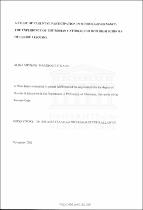| dc.contributor.advisor | Fataar, A | |
| dc.contributor.advisor | Kallaway, P | |
| dc.contributor.author | Kaibe, A.M.M | |
| dc.date.accessioned | 2022-10-06T10:18:59Z | |
| dc.date.available | 2022-10-06T10:18:59Z | |
| dc.date.issued | 2001 | |
| dc.identifier.uri | http://hdl.handle.net/11394/9339 | |
| dc.description | Magister Philosophiae - MPhil | en_US |
| dc.description.abstract | The purpose of this study is to investigate how the policy of education decentralization as framed in the Lesotho Education Act of 1995 has impacted on school governance at the Roman Catholic Church High Schools of Leribe in Lesotho. The background of the Roman Catholic Church in relation to secularization of education is described to show how this church has historically responded towards the secularization of educational governance. Pre and post independence educational policies are traced to demonstrate that these policies are geared towards the political inclinations of the ruling government. The rhetoric of this new policy is to involve parental participation in school governance in order to promote equitable and democratic decision-making in education management. The reality is that parents are involved in school management because they are expected to pay more for the education of their children. However, critical analysts have demonstrated that the promises that are said to accrue from decentralization policy are not easily realized in Sub-Saharan African countries because of their marginal status within the international capitalist economy. The Structural Adjustment Programme is described in this study to show how it has impacted on the national education systems of the Third World countries in Sub-Saharan Africa. The areas of focus are the following: the evaluation of participants roles and responsibilities in school governance; the examination of the role of parental participation in the process of restructuring school governance; and the investigation of both the forces that support and hinder parental participation in school governance. This study suggests that generally the stated aim of promoting equitable and democratic decision making in educational management has not been achieved. The reasons for not achieving this aim are the unclear definitions of supervision and management of the school; the attitude of the principals; the use of only English language in education documents, ignorance of parent contribution by other parties. And also, the legislation does not give parents real decision-making power in staffing requirements and does not include them in curriculum development, examinations and funding. | en_US |
| dc.language.iso | en | en_US |
| dc.publisher | University of the Western Cape | en_US |
| dc.subject | Policy of education | en_US |
| dc.subject | School governance | en_US |
| dc.subject | Roman catholic church | en_US |
| dc.subject | Educational governance | en_US |
| dc.subject | School management | en_US |
| dc.title | A study of parental participation in school governance: the experience of the roman catholic church high schools of Leribe Lesotho | en_US |
| dc.rights.holder | University of the Western Cape | en_US |

